
Michael Dobbs (born 27 July 1950) is a British-American non-fiction author and journalist.

Michael Dobbs (born 27 July 1950) is a British-American non-fiction author and journalist.
Dobbs was born in Belfast, Northern Ireland and graduated from the University of York in 1972, with a BA in Economics & Economic History, [1] and completed fellowships at Princeton and Harvard. [2] He became a U.S. citizen in 2010.
Dobbs spent much of his career as a foreign correspondent covering the collapse of communism. He was the first Western reporter to visit the Gdansk shipyard in August 1980; he also covered the Tiananmen Square uprising in China in 1989, the abortive coup against Mikhail Gorbachev in August 1991, and the wars in the former Yugoslavia.[ citation needed ] He joined The Washington Post in 1980, when he was appointed bureau chief in eastern Europe (1980–1981), based in Warsaw. He was also bureau chief in Paris (1982–1986) and Moscow (1988–1993). Other assignments included stints in Rome for Reuters news agency (1974–1975), in Africa as a freelancer (1976), and as a special correspondent in Belgrade (1977–1980), when he covered the death of Marshal Josip Broz Tito. [3]
In Washington, he worked for the Post as a United States Department of State reporter and as a foreign investigative reporter, covering the Dayton peace process. [4] [5] During the U.S. presidential campaign in 2008, he returned to the newspaper to launch its online "Fact Checker" column.
Dobbs is the author of the "Cold War trilogy", a series of books about the climactic moments of the Cold War. His Down with Big Brother: The Fall of The Soviet Empire was a runner-up for the 1997 PEN award for nonfiction. His hour-by-hour study of the Cuban Missile Crisis, One Minute to Midnight: Kennedy, Khrushchev, and Castro on the Brink of Nuclear War, was a finalist for the 2008 Los Angeles Times history prize and was named one of five non-fiction books of the year by The Washington Post. The final book in the trilogy, Six Months in 1945: From World War to Cold War (Knopf, 2012), describes the division of Europe into American and Soviet spheres of influence after World War II.
His 2019 book, The Unwanted: America, Auschwitz, and a Village Caught in Between won the Jewish Book Club Award for Holocaust Studies. It tells the story of Jewish families desperately seeking American visas to escape Nazi Germany during the years leading up to the Holocaust. [6] Earlier books include a biography of former Secretary of State Madeleine Albright and Saboteurs: The Nazi Raid on America, about a bungled Nazi sabotage attempt directed against the United States in 1942.
Michael Dobbs was a visiting professor in the Department of Communications Studies at the University of Michigan from 2010–2011; he has also taught at Princeton, Georgetown, and American universities. He is a staff member of the U.S. Holocaust Museum, where he organized conferences of international decision-makers on the genocides in Rwanda and Bosnia. He also covered the genocide trial of former Bosnian Serb military commander Ratko Mladić for Foreign Policy magazine.
Dobbs's most recent book is King Richard: Nixon and Watergate - an American Tragedy, (Knopf, 2021) which earned starred reviews from Publishers Weekly [7] and Kirkus, [8] and was described as "intimate and extraordinary" by Jennifer Szalai in The New York Times. [9]
Dobbs, who lives outside Washington D.C., is a distant relative of Michael Dobbs, the British politician and author of the political thriller House of Cards. [10]

Holocaust denial is an antisemitic conspiracy theory that asserts that the Nazi genocide of Jews, known as the Holocaust, is a myth, fabrication, or exaggeration. Holocaust denial involves making one or more of the following false statements:
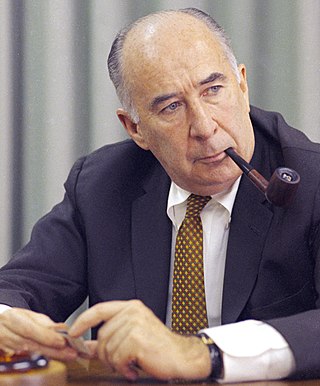
John Newton Mitchell was the 67th Attorney General of the United States, serving under President Richard Nixon. and was chairman of Nixon's 1968 and 1972 presidential campaigns. Prior to that, he had been a municipal bond lawyer and one of Nixon's associates. He was tried and convicted as a result of his involvement in the Watergate scandal.
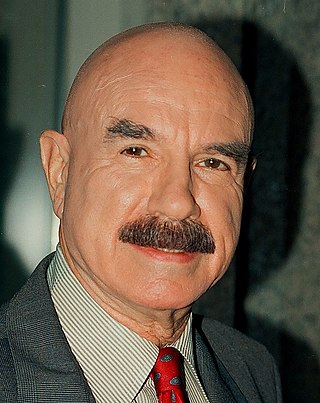
George Gordon Battle Liddy was an American lawyer and FBI agent who was convicted of conspiracy, burglary, and illegal wiretapping for his role in the Watergate scandal during the Nixon administration.

Robert Upshur Woodward is an American investigative journalist. He started working for The Washington Post as a reporter in 1971 and now holds the title of associate editor.
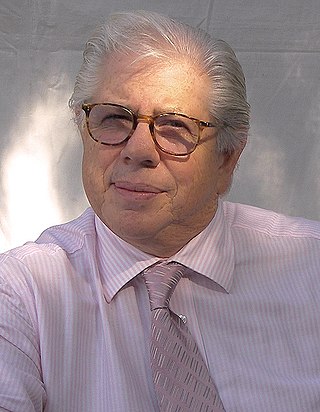
Carl Milton Bernstein is an American investigative journalist and author. While a young reporter for The Washington Post in 1972, Bernstein was teamed up with Bob Woodward, and the two did much of the original news reporting on the Watergate scandal. These scandals led to numerous government investigations and the eventual resignation of President Richard Nixon. The work of Woodward and Bernstein was called "maybe the single greatest reporting effort of all time" by longtime journalism figure Gene Roberts.

Louis Patrick Gray III was acting director of the Federal Bureau of Investigation (FBI) from May 3, 1972, to April 27, 1973. During this time, the FBI was in charge of the initial investigation into the burglaries that sparked the Watergate scandal, which eventually led to the resignation of President Nixon. Gray was nominated as permanent Director by Nixon on February 15, 1973, but failed to win Senate confirmation. He resigned as Acting FBI director on April 27, 1973, after he admitted to destroying documents that had come from convicted Watergate conspirator E. Howard Hunt's safe—documents received on June 28, 1972, 11 days after the Watergate burglary, and given to Gray by White House counsel John Dean.
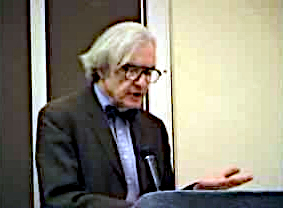
Robert Jay Lifton is an American psychiatrist and author, chiefly known for his studies of the psychological causes and effects of wars and political violence, and for his theory of thought reform. He was an early proponent of the techniques of psychohistory.

Lila Diane Sawyer is an American television broadcast journalist known for anchoring major programs on two networks including ABC World News Tonight, Good Morning America, 20/20, and Primetime newsmagazine while at ABC News. During her tenure at CBS News she hosted CBS Morning and was the first woman correspondent on 60 Minutes. Prior to her journalism career, she was a member of U.S. President Richard Nixon's White House staff and assisted in his post-presidency memoirs. Presently she works for ABC News producing documentaries and interview specials.
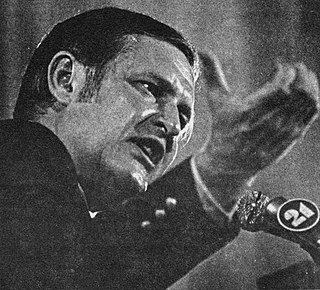
Jack Northman Anderson was an American newspaper columnist, syndicated by United Features Syndicate, considered one of the founders of modern investigative journalism. Anderson won the 1972 Pulitzer Prize for National Reporting for his investigation on secret U.S. policy decision-making between the United States and Pakistan during the Indo-Pakistani War of 1971. In addition to his newspaper career, Anderson also had a national radio show on the Mutual Broadcasting System, acted as Washington bureau chief of Parade magazine, and was a commentator on ABC-TV's Good Morning America for nine years.
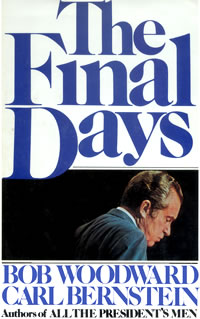
The Final Days is a 1976 non-fiction book written by Bob Woodward and Carl Bernstein about the Watergate scandal. A follow up to their 1974 book All the President's Men, The Final Days concerns itself with the final months of the Presidency of Richard Nixon including battles over the Nixon White House tapes and the impeachment process against Richard Nixon.

Hirsch Moritz "Harry" Rosenfeld was an American newspaper editor who was the editor in charge of local news at The Washington Post during the Richard Mattingly murder case and the Watergate scandal. He oversaw the newspaper's coverage of Watergate and resisted efforts by the paper's national reporters to take over the story. Though Post executive editor Ben Bradlee gets most of the credit, managing editor Howard Simons and Rosenfeld worked most closely with reporters Bob Woodward and Carl Bernstein on developing the story. Rosenfeld published a memoir including an account of his work at the Post in 2013.

Operation Pastorius was a failed German intelligence plan for sabotage inside the United States during World War II. The operation was staged in June 1942 and was to be directed against strategic American economic targets. The operation was named by Admiral Wilhelm Canaris, chief of the German Abwehr, for Francis Daniel Pastorius, the organizer of the first organized settlement of Germans in America. The plan involved eight German saboteurs who had previously spent time in the United States.

Saul Friedländer is a Czech-Jewish-born historian and a professor emeritus of history at UCLA.
Names of the Holocaust vary based on context. "The Holocaust" is the name commonly applied in English since the mid-1940s to the systematic extermination of 6 million Jews by Nazi Germany during World War II. The term is also used more broadly to include the Nazi Party's systematic murder of millions of people in other groups they determined were "Untermenschen" or "subhuman," which included primarily the Jews and the Slavs, the former having allegedly infected the latter, including ethnic Ukrainians, Poles, the Serbs, Russians, the Czechs and others.

Richard Gregory Tuck was an American political consultant, campaign strategist, advance man, and political prankster.
Robert Gellately is a Canadian academic and noted authority on the history of modern Europe, particularly during World War II and the Cold War era.
Mark Riebling is an American author. He has written two books: Wedge: The Secret War between the FBI and CIA and Church of Spies: The Pope's Secret War Against Hitler.
Theodore Harold White was an American political journalist and historian, known for his reporting from China during World War II and the Making of the President series.
Richard David Breitman, born in 1947, is an American historian best known for his study of the Holocaust.

"New York at War" was a military parade and civilian home front procession held supporting the World War II mobilization effort on June 13, 1942. It was considered at the time the largest parade ever held in New York City, with up to 500,000 marching up Fifth Avenue and 2,500,000 spectators in attendance.